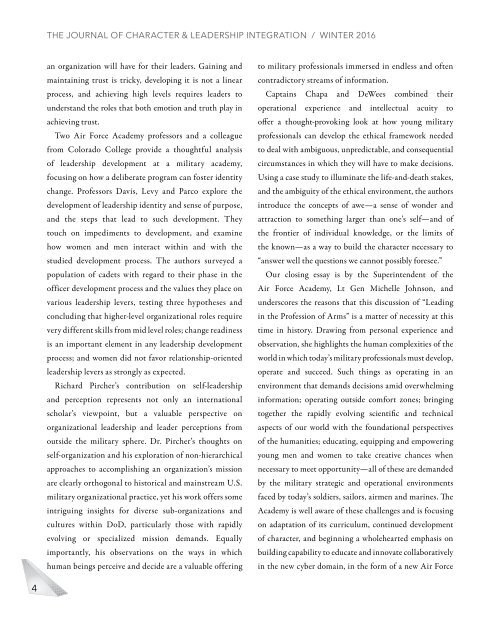PROFESSION OF ARMS
Yi5mwL
Yi5mwL
You also want an ePaper? Increase the reach of your titles
YUMPU automatically turns print PDFs into web optimized ePapers that Google loves.
THE JOURNAL <strong>OF</strong> CHARACTER & LEADERSHIP INTEGRATION / WINTER 2016<br />
an organization will have for their leaders. Gaining and<br />
maintaining trust is tricky, developing it is not a linear<br />
process, and achieving high levels requires leaders to<br />
understand the roles that both emotion and truth play in<br />
achieving trust.<br />
Two Air Force Academy professors and a colleague<br />
from Colorado College provide a thoughtful analysis<br />
of leadership development at a military academy,<br />
focusing on how a deliberate program can foster identity<br />
change. Professors Davis, Levy and Parco explore the<br />
development of leadership identity and sense of purpose,<br />
and the steps that lead to such development. They<br />
touch on impediments to development, and examine<br />
how women and men interact within and with the<br />
studied development process. The authors surveyed a<br />
population of cadets with regard to their phase in the<br />
officer development process and the values they place on<br />
various leadership levers, testing three hypotheses and<br />
concluding that higher-level organizational roles require<br />
very different skills from mid level roles; change readiness<br />
is an important element in any leadership development<br />
process; and women did not favor relationship-oriented<br />
leadership levers as strongly as expected.<br />
Richard Pircher’s contribution on self-leadership<br />
and perception represents not only an international<br />
scholar’s viewpoint, but a valuable perspective on<br />
organizational leadership and leader perceptions from<br />
outside the military sphere. Dr. Pircher’s thoughts on<br />
self-organization and his exploration of non-hierarchical<br />
approaches to accomplishing an organization’s mission<br />
are clearly orthogonal to historical and mainstream U.S.<br />
military organizational practice, yet his work offers some<br />
intriguing insights for diverse sub-organizations and<br />
cultures within DoD, particularly those with rapidly<br />
evolving or specialized mission demands. Equally<br />
importantly, his observations on the ways in which<br />
human beings perceive and decide are a valuable offering<br />
to military professionals immersed in endless and often<br />
contradictory streams of information.<br />
Captains Chapa and DeWees combined their<br />
operational experience and intellectual acuity to<br />
offer a thought-provoking look at how young military<br />
professionals can develop the ethical framework needed<br />
to deal with ambiguous, unpredictable, and consequential<br />
circumstances in which they will have to make decisions.<br />
Using a case study to illuminate the life-and-death stakes,<br />
and the ambiguity of the ethical environment, the authors<br />
introduce the concepts of awe—a sense of wonder and<br />
attraction to something larger than one’s self—and of<br />
the frontier of individual knowledge, or the limits of<br />
the known—as a way to build the character necessary to<br />
“answer well the questions we cannot possibly foresee.”<br />
Our closing essay is by the Superintendent of the<br />
Air Force Academy, Lt Gen Michelle Johnson, and<br />
underscores the reasons that this discussion of “Leading<br />
in the Profession of Arms” is a matter of necessity at this<br />
time in history. Drawing from personal experience and<br />
observation, she highlights the human complexities of the<br />
world in which today’s military professionals must develop,<br />
operate and succeed. Such things as operating in an<br />
environment that demands decisions amid overwhelming<br />
information; operating outside comfort zones; bringing<br />
together the rapidly evolving scientific and technical<br />
aspects of our world with the foundational perspectives<br />
of the humanities; educating, equipping and empowering<br />
young men and women to take creative chances when<br />
necessary to meet opportunity—all of these are demanded<br />
by the military strategic and operational environments<br />
faced by today’s soldiers, sailors, airmen and marines. The<br />
Academy is well aware of these challenges and is focusing<br />
on adaptation of its curriculum, continued development<br />
of character, and beginning a wholehearted emphasis on<br />
building capability to educate and innovate collaboratively<br />
in the new cyber domain, in the form of a new Air Force<br />
4


